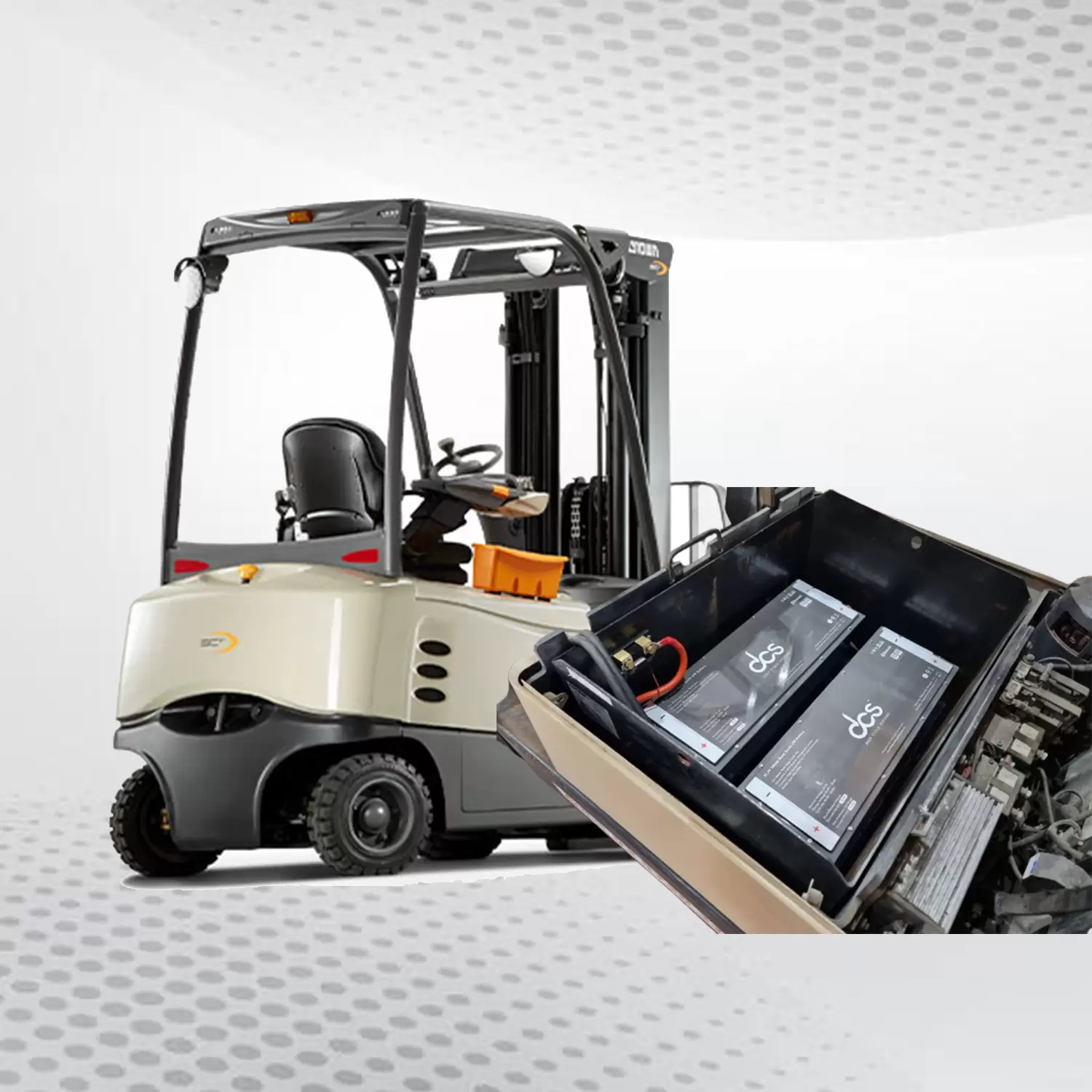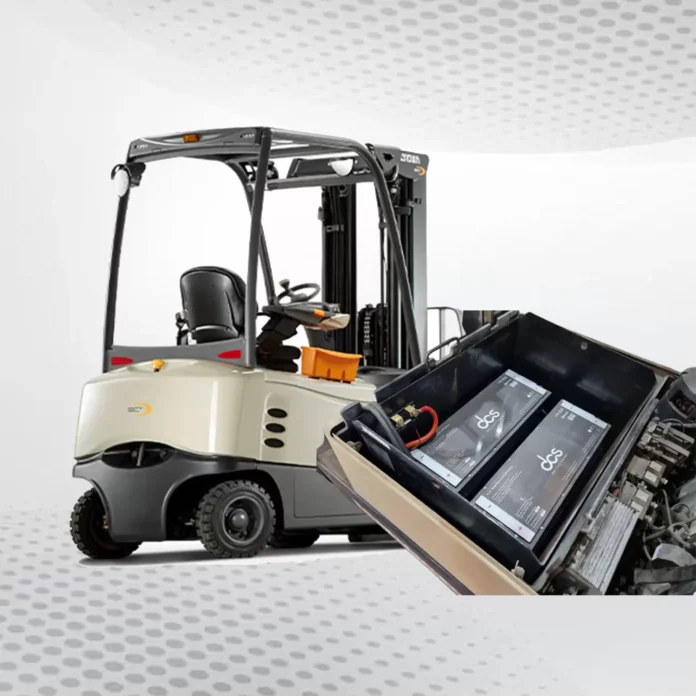Welcome to our comprehensive guide on lithium-ion forklift batteries. With the increasing popularity and demand for electric forklifts, it is important to understand the technology behind the power source – the lithium ion forklift battery. This guide will provide you with all the necessary information you need to know about these batteries, including their benefits, features, and maintenance tips. Whether you are considering switching to a lithium-ion forklift or want to learn more about them, this guide is the perfect resource. So, let’s dive in and explore the world of lithium-ion forklift batteries.
The Basic Principles of Lithium-Ion Batteries
Lithium-ion batteries are a cornerstone in rechargeable energy solutions, employing lithium ions as their primary agents of electrical generation. Within these batteries, a sophisticated assembly of cells hosts a cathode (positive electrode), an anode (negative electrode), and an intervening electrolyte. Upon charging, lithium ions traverse from the cathode to the anode through the electrolyte, a movement that is pivotal to the battery’s ability to store energy.
Conversely, during the discharge phase, these ions navigate back to the cathode, releasing stored energy, which is then harnessed to power the forklift. This dynamic exchange of lithium ions not only underpins the functionality of the battery but also ensures a consistent and reliable power source for extensive and demanding usage. The distinct mechanism of action within lithium-ion batteries facilitates a higher energy density, a critical factor contributing to their widespread preference in powering forklifts and other heavy machinery.
Advantages of Using Forklift Battery Lithium Ion
Adopting forklift battery lithium ion technology brings many advantages that significantly enhance material handling operations’ operational efficiency and sustainability. One of the most notable benefits is the remarkable improvement in energy density that lithium-ion batteries offer over traditional lead-acid batteries. This higher energy density means forklifts can operate on a single charge for longer periods, reducing the frequency of charging intervals and increasing uptime for critical warehouse and logistics activities.
Another pivotal advantage is the rapid charging capability of lithium-ion batteries. Unlike their lead-acid counterparts, which typically require an overnight charge to reach full capacity, lithium-ion batteries can be charged to a substantial level in a fraction of the time. This facilitates more flexible charging schedules and allows for opportunity charging during breaks or downtime, further maximising forklift availability.
Lithium-ion forklift batteries’ durability and maintenance benefits also contribute significantly to their appeal. These batteries exhibit a lower degradation rate, even with frequent charging, which extends their usable life and reduces the need for replacements. Lithium-ion batteries are virtually maintenance-free, eliminating the time and cost of regular maintenance required for lead-acid batteries, such as water top-ups and equalisation charges.
Assessing the Cost Implications of Lithium-Ion Solutions
The initial financial outlay for lithium-ion batteries is perceived to be higher than that of their lead-acid counterparts, which may deter some decision-makers at first glance. However, it is imperative to delve deeper into the total cost of ownership to appreciate these solutions’ economic viability truly. Lithium-ion batteries distinguish themselves by longevity, boasting a lifespan extending significantly beyond traditional batteries. This inherent durability translates to fewer replacements over the years, contributing to cost savings in the long term.
Furthermore, the efficiency gains from rapid charging capabilities must be balanced. The ability to quickly recharge batteries means less downtime for forklifts, enhancing operational productivity and reducing the need for additional units to compensate for charging periods. Additionally, the minimal maintenance requirements of lithium-ion batteries further consolidate their cost-effectiveness. The absence of the need for water top-ups, alongside fewer instances of battery degradation, results in lower ongoing maintenance expenses.
When considering these factors collectively, the cost implications of adopting lithium-ion solutions suggest a compelling investment case. Businesses are encouraged to evaluate the broader financial landscape, factoring in reduced operational disruptions and maintenance savings, to make an informed decision on transitioning to lithium-ion battery technology for their forklift fleets.
Safety Features of a Li Ion Battery Forklift
Lithium-ion batteries for forklifts are engineered with many safety mechanisms to mitigate risks associated with their operation. One of the most significant safety features is the Battery Management System (BMS). This sophisticated circuitry monitors and regulates the battery’s state of charge, temperature, and voltage across individual cells.
The BMS ensures operations remain within safe parameters, thereby preventing overcharging, deep discharging, and overheating – common issues that can compromise battery safety and longevity. Lithium-ion cells are housed in a durable case that provides physical protection and aids in temperature regulation, further enhancing their safety profile.
Thermal runaway, a concern in earlier generations of lithium-ion technology, is significantly reduced through advancements in li ion battery forklift chemistry and the inclusion of flame-retardant materials. These batteries also exhibit high electrical efficiency, minimising heat generation during operation and charging. These safety features collectively make lithium-ion batteries a reliable and secure power source for forklift operations, ensuring the protection of the equipment and its operators.
 How to Transition To Lithium-Ion Batteries for Your Fleet
How to Transition To Lithium-Ion Batteries for Your Fleet
Embarking on the journey towards incorporating lithium-ion batteries into your forklift fleet necessitates a structured approach to ensure seamless integration. Begin by comprehensively auditing your current energy utilisation and forklift operational patterns. This assessment will aid in determining the appropriate specifications for the lithium-ion batteries required to meet your operational demands.
Engage with established manufacturers or suppliers with a track record of delivering reliable lithium-ion solutions for material handling applications. Piloting the technology with a small segment of your fleet is also advisable to gauge Performance and operational impact before committing to a full-scale rollout. Training for your technical team on handling and maintenance specifics for lithium-ion batteries will be crucial to maximising their lifespan and efficiency.
Review your facility’s charging infrastructure to ensure it is compatible with the new batteries, considering any necessary upgrades or modifications. Collaboration with a knowledgeable partner throughout this transition can provide valuable insights and support, making the shift to lithium-ion technology smooth and beneficial for your operations.
Choosing the Right Lithium Ion Batteries for Forklifts
Selecting the appropriate lithium ion batteries for forklifts involves a nuanced understanding of your specific operational requirements and the technical specifications of available batteries. Factors such as the average duration of use, the intensity of operations, and the environment in which the forklifts operate must be considered. A battery with a higher energy density is preferable for intensive, long-duration tasks.
In contrast, operating with short bursts of activity benefits from batteries optimised for rapid charging. Compatibility with your existing fleet is also a crucial consideration. Ensure the batteries you select can be seamlessly integrated with the make and model of your forklifts, paying attention to dimensions, weight, and electrical requirements. Evaluating the total cost of ownership, including initial purchase price, projected lifespan, maintenance expenses, and potential efficiency gains, will guide you towards a financially viable choice.
Consultation with manufacturers or specialised suppliers can provide valuable insights, offering tailored advice based on an in-depth analysis of your needs. Such partnerships can also afford access to the latest technological advancements and bespoke solutions designed to maximise the Performance and sustainability of your forklift operations.
Maintenance And Care For Lithium-Ion Batteries Add Four Bullet Points.
Ensuring lithium-ion forklift batteries’ long-term reliability and performance hinges on adhering to a robust maintenance and care regime. Whilst these batteries are celebrated for their low maintenance requirements, certain practices can help in maximising their lifespan and efficiency:
Regular Inspections
Conduct routine checks to identify any damage or wear on the battery and its connections. This includes looking for cracks, leaks, or other abnormalities affecting Performance. Early detection of potential issues allows for timely interventions, preventing minor problems from escalating into major faults.
Optimal Charging Practices
Adhere to the manufacturer’s recommended charging guidelines to maintain battery health. Avoid overcharging or deep discharging the battery, as both can significantly impact its lifespan. Implementing opportunity charging, where the battery is topped up during breaks without fully depleting its charge, can also contribute to optimal battery health.
Cleanliness and Storage
Keep the battery and its terminals clean and free from dust and debris. Wipe the battery casing with a soft, dry cloth and ensure the storage area is dry and stable. Proper storage conditions prevent corrosion and other damage that could impair battery functionality.
Firmware Updates and Diagnostics
Update the Battery Management System (BMS) firmware regularly and perform diagnostic checks to ensure the battery operates within its optimal parameters. These updates can improve the battery’s efficiency and help identify potential issues before they become problematic.
Optimising Performance with Electric Forklift Lithium Ion Battery
To optimise the Performance of electric forklifts powered by lithium-ion batteries, it is essential to leverage the unique characteristics of these batteries. Proper charge cycle management is crucial; implementing opportunity charging strategies can keep forklifts operational without significant downtime, maximising efficiency. Adjusting operational parameters to match lithium-ion batteries’ energy output and consumption profiles can lead to substantial performance gains.
It involves calibrating the forklift’s power settings to align with the battery’s optimal operating range, ensuring energy is used judiciously without compromising operational output. Furthermore, monitoring electric forklift lithium ion battery health through the Battery Management System (BMS) allows for real-time adjustments and proactive maintenance, preventing performance degradation over time.
Emphasising training for operators on best practices for battery usage and care can also significantly impact the longevity and reliability of the battery, thereby sustaining peak performance levels. By adopting these strategies, businesses can unlock the full potential of their electric forklifts equipped with lithium-ion batteries, achieving a harmonious balance between high-efficiency operations and energy management.
Conclusion
Embarking on integrating lithium-ion batteries into your forklift fleet represents a forward-thinking approach to operational efficiency and sustainability. This guide has traversed the significant aspects of lithium-ion battery technology, underscoring its benefits, safety features, and maintenance requirements. As industries evolve, adopting these advanced energy solutions positions businesses advantageously for future challenges, marrying environmental responsibility with enhanced productivity. The journey towards a more efficient and sustainable operational model powered by lithium-ion technology is not just a choice but a strategic imperative for forward-looking enterprises.
FAQs
What are the benefits of using a lithium-ion forklift battery?
The benefits of using a lithium-ion forklift battery include longer operational life, faster charging times, and reduced maintenance needs. Unlike lead-acid batteries, lithium-ion batteries do not require regular watering, equalizing, or cooling down periods. This results in less downtime and higher efficiency for warehouse and industrial operations.
How long does a lithium-ion forklift battery last?
A key advantage of a lithium-ion forklift battery is its longevity. It typically lasts between 2,000 and 3,000 charging cycles, equating to 5 to 10 years of use, depending on the usage intensity. This lifespan is significantly longer than traditional lead-acid batteries, making lithium-ion batteries a more cost-effective solution over time.
How does charging a lithium ion forklift battery differ from charging a lead-acid battery?
Charging a lithium ion forklift battery is faster and more efficient than charging a lead-acid battery. Lithium-ion batteries can be charged at any time without needing to be fully discharged first, known as opportunity charging. This flexibility allows operators to charge the battery during breaks, thus maintaining productivity without lengthy charging downtime.
Are there any safety concerns with lithium-ion forklift batteries?
Lithium-ion forklift batteries are designed with a comprehensive set of safety features to prevent overcharging, overheating, and short-circuiting issues. However, it is crucial to use the battery according to the manufacturer’s guidelines and ensure that the charging environment is safe and free from hazards. Regular inspections and maintenance checks are also recommended to ensure optimal performance and safety.
| Related Business Listings |
| Contact Directory |
| Local Business Profiles |
